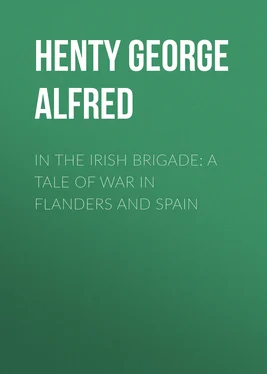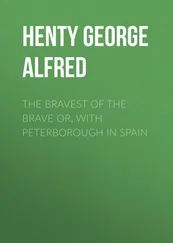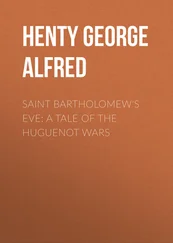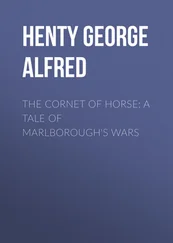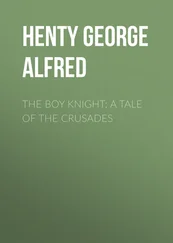George Henty - In the Irish Brigade - A Tale of War in Flanders and Spain
Здесь есть возможность читать онлайн «George Henty - In the Irish Brigade - A Tale of War in Flanders and Spain» — ознакомительный отрывок электронной книги совершенно бесплатно, а после прочтения отрывка купить полную версию. В некоторых случаях можно слушать аудио, скачать через торрент в формате fb2 и присутствует краткое содержание. Жанр: foreign_children, foreign_antique, foreign_prose, на английском языке. Описание произведения, (предисловие) а так же отзывы посетителей доступны на портале библиотеки ЛибКат.
- Название:In the Irish Brigade: A Tale of War in Flanders and Spain
- Автор:
- Жанр:
- Год:неизвестен
- ISBN:нет данных
- Рейтинг книги:5 / 5. Голосов: 1
-
Избранное:Добавить в избранное
- Отзывы:
-
Ваша оценка:
- 100
- 1
- 2
- 3
- 4
- 5
In the Irish Brigade: A Tale of War in Flanders and Spain: краткое содержание, описание и аннотация
Предлагаем к чтению аннотацию, описание, краткое содержание или предисловие (зависит от того, что написал сам автор книги «In the Irish Brigade: A Tale of War in Flanders and Spain»). Если вы не нашли необходимую информацию о книге — напишите в комментариях, мы постараемся отыскать её.
In the Irish Brigade: A Tale of War in Flanders and Spain — читать онлайн ознакомительный отрывок
Ниже представлен текст книги, разбитый по страницам. Система сохранения места последней прочитанной страницы, позволяет с удобством читать онлайн бесплатно книгу «In the Irish Brigade: A Tale of War in Flanders and Spain», без необходимости каждый раз заново искать на чём Вы остановились. Поставьте закладку, и сможете в любой момент перейти на страницу, на которой закончили чтение.
Интервал:
Закладка:
"Owing to the dilatory habits and hesitation of the Austrian prince, the junction was not effected for some time, and then, in spite of the entreaties of the two English generals, he could not be persuaded to make a movement towards Madrid. Peterborough, whose temper was extremely fiery, at last lost all patience, abused Charles openly, and then, mounting his horse, rode down to the coast, embarked upon an English ship of war, and sailed away to assist the Duke of Savoy. After his departure, the ill feeling between the English force, the Portuguese, and the leaders of the Spanish adherents of Charles increased, and they spent their time in quarrelling among themselves. They were without money, magazines, and almost without provisions. Berwick was near them with a superior force, and they took the only step open, of retreating towards Valencia, which they reached, after suffering great hardships, before Berwick could overtake them.
"French troops were poured into Spain, while no reinforcements were sent from England. Galway and the Portuguese advanced to meet the Duke of Berwick, who was marching with a large army to occupy Catalonia.
"The two forces met, on the plain of Almanza, on the 24th of April. We and the Spaniards were superior in number to the English, Dutch, and Portuguese. The battle was maintained for six hours. The Portuguese infantry did little, but the English and Dutch repulsed charge after charge, even after the Portuguese and Spanish allies on both wings were defeated. But, in the end, victory remained with us. Galway and Das Minas, the Portuguese general, were both wounded, and five thousand of their men killed, and yet the Dutch and English infantry held together.
"But on the following day, being absolutely without supplies, some effected their escape and succeeded in reaching Portugal, while the main body surrendered. Valencia, Saragossa, and other towns opened their gates to us, and, for a time, the cause of the Archduke Charles seemed lost.
"Our success was, however, balanced by the loss, in the same year, of the whole of the Spanish possessions in Italy. As yet, in spite of the disasters that had befallen him, the cause of Charles was not altogether lost, for he received fresh promises of support from England, whose interest it was to continue the war in Spain, and thus compel France to keep a considerable body of troops there, instead of employing them against Marlborough in Flanders.
"Galway and Das Minas were taken back to Portugal, in an English fleet, after their disaster, and General Stanhope, who, they say, is an officer of great military experience and talent, has been sent out to take the command; and as a portion of Catalonia is still held for Charles, there may yet be a good deal of hard fighting, before the matter can be considered finally settled."
"Thank you, O'Neil. I feel that I know something about it, now. Are there any of our regiments there?"
"Yes, three of them. There is also an Irish regiment in the Spanish service, under Colonel Crofton;" and with this, the talk ended for the night.
After three months' work Desmond was dismissed from drill, and had obtained such a proficiency with the rapier that he felt that he could now relax his work, and see something of the city, which he had been hitherto too busy to explore. He had seen the principal streets, in the company of his comrades, had admired the mansions of the nobles, the richness of the goods exposed to view in the windows, and the gaiety and magnificence of the dresses of the upper class. His friends had warned him that, if he intended to go farther, he should never do so alone, but should take with him his soldier servant, a trooper named Mike Callaghan.
Mike was some twenty-eight years old, strong and bony; his hair was red, and the natural colour of his face was obscured by a host of freckles; his eyes were blue, and his nose had an upward turn; his expression was merry and good humoured, but there was a twinkle about his eyes that seemed to show that he was by no means wanting in shrewdness.
"Even in the daytime," O'Neil said, "it is not safe for a man, if well dressed and likely to carry money in his pocket, to go into some quarters of the town. Paris has always been a turbulent city, and, while it is the abode of the richest and noblest of Frenchmen, it is also the resort of the rascaldom of all France. Some streets are such that even the city guard would not venture to search for an ill doer, unless in considerable force and prepared for battle. There are, of course, many streets, both on this and the other side of the river, where life and property are as safe as in the Rue Royal; which, by the way, is not saying much, for it was only three days ago that a man was assassinated there in broad daylight. He was a captain in the Picardy regiment, and it was supposed that his murderer was a man who had been dismissed from the regiment with ignominy. But, whoever it was, he has got clear away, for your Parisian citizen takes good care not to interfere in such matters, and no one thought of laying hands on the villain, although it is said he walked quietly off.
"It is in the streets that I am speaking of that adventures may most easily be met with. Here there are too many hotels of the nobles, with their numerous retainers, for it to be safe to commit crime, and the city guard are generally on the alert, for, were harm to come to one of the gentlemen attached to the great houses, the matter would be represented to the king, and the city authorities would come in for a sharp reproof for their failure to keep order in the city; whereas, anything that happens among the bourgeois would pass wholly without notice. However, if you keep out of the wine shops, you are not likely to become involved in trouble. Nine-tenths of the quarrels and tumults originate there. There is a dispute, perhaps, between a soldier and a citizen, or between soldiers of different regiments, and in a minute or two twenty swords are drawn, and the disturbance grows, sometimes, until it is necessary to call out troops from the nearest barracks to suppress it. However, I know that you are not likely to get into trouble that way, for you are a very model of moderation, to the corps."
"I have seen enough of the consequences of drink in Ireland," Desmond said, "to cure me of any desire for liquor, even had I a love for it. Faction fights, involving the people of the whole barony, arising from some drunken brawl, are common enough; while among the better class duels are common and, for the most part, are the result of some foolish quarrel between two men heated by wine. Besides, even putting that aside, I should have given up the habit. When I joined the regiment, I was anxious to become a good swordsman, but if one's head is overheated at night, one's hand would be unsteady and one's nerves shaken in the morning.
"Possibly," he added, with a smile, "it is this, quite as much as the hotness of their temper, that prevents the best teachers from caring to undertake the tuition of the officers of the Brigade."
"Possibly," Phelim laughed, "though I never thought of it before. There is no doubt that the French, who, whatever their faults be, are far less given to exceeding a fair allowance of wine than are our countrymen, would come to their morning lessons in the saloon in a better condition to profit by the advice of the master than many of our men."
"I don't think," Patrick O'Neil said, "that we Irishmen drink from any particular love of liquor, but from good fellowship and joviality. One can hardly imagine a party of French nobles inflaming themselves with wine, and singing, as our fellows do. Frenchmen are gay in what I may call a feeble way–there is no go in it. There is no spirit in their songs, there is no real heartiness in their joviality, and the idea of one man playing a practical joke upon another, the latter taking it in good part, could never enter their heads, for they are ready to take offence at the merest trifle.
Читать дальшеИнтервал:
Закладка:
Похожие книги на «In the Irish Brigade: A Tale of War in Flanders and Spain»
Представляем Вашему вниманию похожие книги на «In the Irish Brigade: A Tale of War in Flanders and Spain» списком для выбора. Мы отобрали схожую по названию и смыслу литературу в надежде предоставить читателям больше вариантов отыскать новые, интересные, ещё непрочитанные произведения.
Обсуждение, отзывы о книге «In the Irish Brigade: A Tale of War in Flanders and Spain» и просто собственные мнения читателей. Оставьте ваши комментарии, напишите, что Вы думаете о произведении, его смысле или главных героях. Укажите что конкретно понравилось, а что нет, и почему Вы так считаете.
